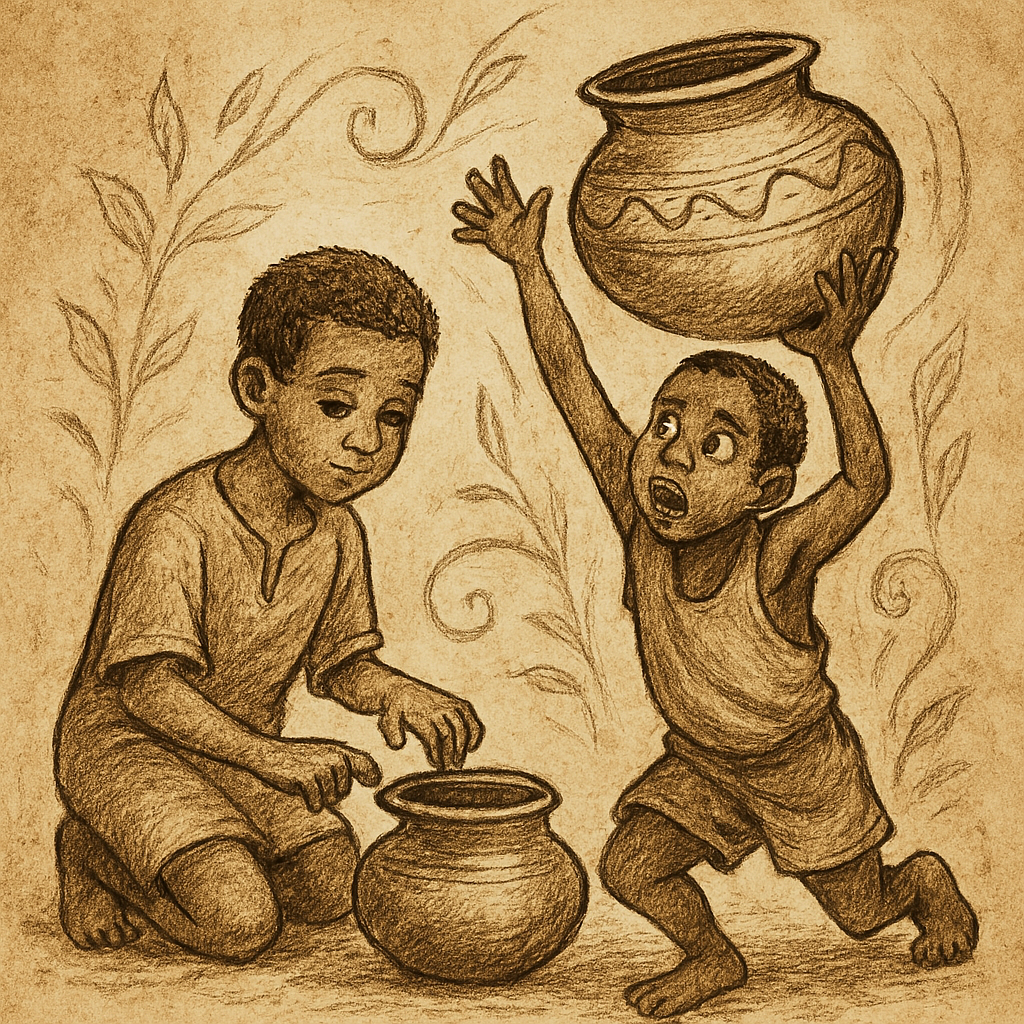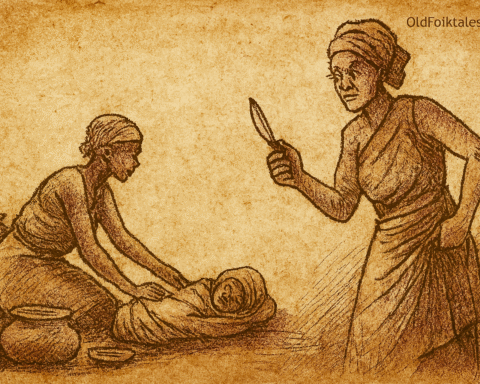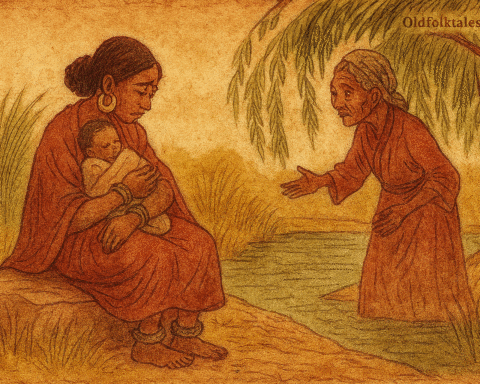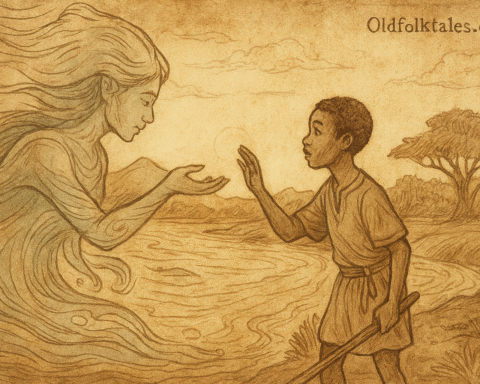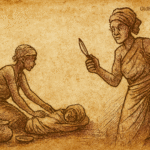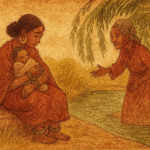This story was passed down through generations, from grandmother to mother to child, teaching the ancient wisdom that flows like rivers through the hills of Cameroon. It is a tale that shaped the music of flutes and the fate of humanity itself.
The Family’s Journey
In a time when the earth was younger and spirits walked more freely among mortals, there lived a man blessed with two wives, each bearing him four children. As the family grew like a flourishing tree with many branches, the fertile land near their village became scarce. Year after year, they were forced to trek farther from home, climbing steep hills and crossing treacherous rivers to find soil rich enough to sustain their growing household.
The women cultivated farms in distant places: one year at Akontom, three years later at Ntah Metse, and one woman even established her cocoyam farm as far away as Mbe-amfi. This life demanded great sacrifice, for they had to ascend and descend at least seven hills before reaching any of these farms, and crossing rivers during the rainy and harvest seasons was perilous work that tested their endurance and courage.
Also read: The Lost Dish
The Forgotten Flute
One fateful day, as golden sunlight painted the sky and the family prepared for another day of labor, a son of the first wife tucked his precious flute into his bag. This instrument, crafted by his own hands from bamboo, was his constant companion brown and weathered, simple yet dear to his heart. After a long day of toiling in the fields, exhaustion weighed heavy on their shoulders as sunset approached. In their haste to return home before darkness claimed the forest paths, the boy left his beloved flute behind.
Back in the safety of their compound, as cooking fires crackled and the evening meal was prepared, the boy’s heart grew heavy with longing. “I cannot sleep if I do not go and retrieve my flute,” he declared to his parents and stepmother, his voice trembling with desperate need.
“No! It’s already dark,” they protested in unison, their faces etched with worry.
“I must go for it,” the boy insisted, his determination burning bright as a flame.
“You cannot. That farm has ghosts,” they warned. “Why do you insist on going there tonight? Can’t you collect it tomorrow when we return to work?”
But the boy’s resolve was unshakeable. “I must go for my flute!”
His parents recounted terrifying stories of what befell disobedient children, tales meant to freeze the blood and still the restless heart. Yet nothing could shake his determination. Finally, seeing that their son’s will was as immovable as mountain stone, they reluctantly let him go. After all, as the elders say, if you put your hand in fire and the fire burns you, you should not complain. They feared their son was behaving like the chirping cricket that invites its own death.
The Encounter with Spirits
Throwing caution to the night wind, the boy walked through darkness toward the farm, guided only by starlight and his burning desire. He searched desperately among the furrows and beneath the crops, but his flute remained hidden. Just as despair began to settle in his heart, he noticed a group of the strangest beings he had ever seen, sitting in council and conversing in voices that came through their noses.
“Why are you here? What has brought you to our domain?” one of them snorted with an otherworldly tone.
“This is our farm,” the boy replied respectfully. “I have come for my flute, which I forgot here earlier today.”
“Well, son,” the spirit replied with ancient patience, “this is our home. Your family visits during daylight hours, so you think it belongs to you, but all this realm is ours. If we show you flutes, will you recognize your own?”
“Yes, I can. It is a simple bamboo flute, brown and old. I crafted it myself with these hands.”
The Test of Character
The spirits led the boy into their ethereal house, where wonders beyond mortal imagination awaited. They brought forth a flute that shone so brilliantly one would think the sun had forgotten to close its eyelids. The boy examined it and shook his head. Next came a flute the color of a king’s gold, gleaming with precious beauty. Again, the boy declined.
“Please, bring only my flute,” he requested with humble dignity.
The spirits placed his simple wooden instrument among an array of dazzling flutes, hoping their brightness would deceive his eyes and cloud his judgment. But the boy pushed aside the glittering temptations and selected his own humble creation.
“Is that your flute?” they asked, testing his certainty.
“Yes, it is.”
“Are you absolutely certain this is the instrument you played today?”
“I am certain it is mine.”
“Then play it for us.”
The boy raised the flute to his lips and breathed life into its simple form. His song rose pure and true:
Father and Mother-Mine Warned me not to come here That it was too dark to go so far I did not listen Father and Mother-Mine Warned me about the ghosts I did not listen
The spirits listened to his melody and conferred among themselves, recognizing that this boy possessed a heart difficult to corrupt. “The flute test is over,” they declared, and showed him to a room filled with treasures beyond count things that people yearn for every day of their lives.
The boy examined everything carefully but returned to them saying, “I have scrutinized all these wonders, but nothing in this house is as valuable as my flute.” Even when shown a second room filled with pots of every size and description, the boy remained unmoved. When pressed to accept a gift, he finally selected the smallest pot available.
“Why choose this tiny vessel when large pots could serve your mother’s cooking?” they wondered aloud.
“This is the one that catches my eye,” he replied simply. “I cannot take any other, for I came here only for my flute and nothing else.”
The Safe Return
The spirits warned him never to return and gave him specific instructions: “On your way home, when you hear ‘gwran, gwran, gwran,’ jump into the bushes. When you hear ‘tip, tip, tip,’ come out and continue your journey.”
Following their guidance precisely, the boy made his way safely home, where his relieved parents welcomed him with joy. Though they worried about spiritual contamination and offered him protective medicine mixed with palm oil, the boy declined, declaring himself perfectly well. That night, he slept peacefully while his parents kept anxious vigil.
The next morning, when the boy gave the small pot to his father, miracle unfolded before their eyes. The vessel poured forth endless riches that filled their entire house. The father, recognizing the work of benevolent ancestral spirits, shared the bounty generously among his wives, children, relatives, neighbors, and visitors.
The Corruption of Greed
But the second wife’s heart became poisoned with envy. “People carry flutes and receive good things,” she told her son, beating him viciously when he initially refused to take his instrument to the farm. Her greed burned so hot that she split the poor child’s head open with her blows, stopping only when she saw his blood.
At the farm, she forced the terrified boy to leave his flute behind, then that evening demanded he return alone to retrieve it. “If you don’t go, I will kill you, and we’ll all be banished from this village,” she threatened, beating him again until fear of exile drove him into the dangerous night.
The Tragic Choice
When the spirits asked this second boy to identify his flute among many, his eyes immediately fixed on the most beautiful, decorated instrument. “This is my flute,” he declared greedily.
But when he played it, his song revealed the corruption in his heart:
um um um these ghosts smell um um um these ghosts smell
In the room of pots, without hesitation, he grabbed the largest vessel he could find, thinking only of the treasures it might contain. The spirits gave him the same warnings about the sounds on his journey home, but his greed had already sealed his fate.
The Release of All Disease
The next morning, the second wife locked herself and her children away to secretly enjoy what she believed would be greater riches than her rival had received. But when she opened the large pot, instead of treasures, diseases poured forth like a dark flood, measles, chickenpox, cholera, diarrhea, malaria, yellow fever, epilepsy, sleeping sickness, leprosy, and countless other afflictions.
The illnesses killed the woman and her children instantly. When the concerned husband forced open their door the next day, a small quantity of these diseases escaped into the world. It is said that all the diseases that plague humanity today came from that pot, and had the father not quickly shut the door, there would be far more illnesses and plagues than currently exist on earth.
The Moral Lesson
This profound Beba folktale teaches us that contentment and humility bring blessing, while greed and envy lead to destruction. The first boy’s satisfaction with his simple flute and modest pot rewarded his family with abundance, while the second boy’s mother’s covetousness and dishonesty brought disease and death into the world. The story reminds us that our choices have far-reaching consequences, not just for ourselves but for all humanity. It emphasizes the importance of teaching children proper values, respecting spiritual guidance, and understanding that true wealth comes from gratitude and contentment rather than endless acquisition.
Knowledge Check
Q1: What was the key difference between the two boys in this Beba folktale? A: The first boy was content with his simple bamboo flute and chose the smallest pot, showing humility and gratitude, while the second boy greedily chose the most beautiful flute and largest pot, driven by his mother’s covetousness.
Q2: How did the spirits test the boys’ character in this African folktale? A: The spirits tested them by offering glamorous flutes among simple ones to see if they would choose truthfully, then offered rooms full of treasures and pots to see if greed would corrupt their choices.
Q3: What do the warnings “gwran, gwran, gwran” and “tip, tip, tip” represent in this Cameroonian tale? A: These sounds were spiritual guidance for safe travel through the ghost realm”gwran” meant hide in bushes for protection, while “tip” meant it was safe to continue the journey home.
Q4: What cultural elements from the Beba people appear in this folktale? A: The story includes polygamous family structures, distant farming practices, traditional flute-making, ancestral spirit beliefs, protective medicine (afuondo) mixed with palm oil, and communal sharing of wealth among extended family and neighbors.
Q5: How did diseases enter the world according to this Cameroon legend? A: According to the story, all human diseases came from the large pot that the greedy second wife opened, releasing illnesses like measles, malaria, and cholera into the world when her husband opened their door.
Q6: What lesson does this Beba folktale teach about parenting and child guidance? A: The story shows how the second wife’s greed and violent forcing of her child into dangerous situations led to tragedy, teaching that parents who prioritize material gain over their children’s wellbeing and safety can cause devastating consequences.
Source:The sacred door and other stories: Cameroon folktales of the Beba (1st ed.). Ohio University Press.
